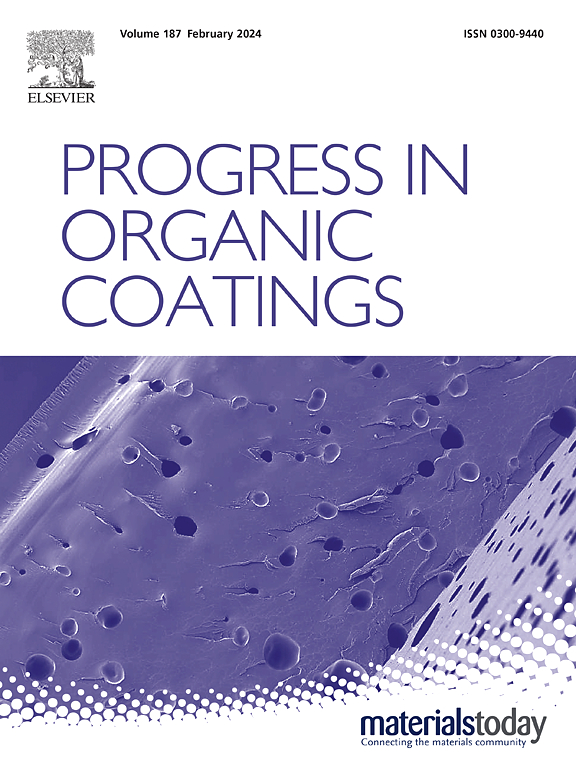Synthesis of a biomass coating: Castor oil-based waterborne polyurethane coatings with high transparency, hydrophobicity and corrosion resistance
IF 7.3
2区 材料科学
Q1 CHEMISTRY, APPLIED
引用次数: 0
Abstract
Bio-based waterborne polyurethanes (CWPUs) were synthesized from castor oil (CO) and polytetrahydrofuran (PTMG) via stepwise crosslinking. Systematic variation of the PTMG:CO molar ratio (10:0–4:6) revealed that increasing CO content elevates crosslink density, raising the glass transition temperature (ΔT = +10.6 °C) while synergistically enhancing thermal stability (T-5% ≤ 280 °C) and hydrophobicity (water contact angle ≤100.59°). Concurrently, water absorption decreased to 2.36 %. Mechanical properties exhibited toughness-strength equilibration (tensile strength: 1.9–5.7 MPa; elongation: 173–1224 %). All films maintained >97 % transparency across 400–800 nm. Critically, the sample with PTMG:CO = 8:2 (CWPU-2) developed surface nano-island microdomains, which conferred exceptional corrosion resistance. This was quantified by a five-order-of-magnitude reduction in corrosion current density (99.999 % inhibition efficiency) and validated by withstanding 12 h immersion in 0.5 M CuSO4, 5 wt% H2SO4, and 5 wt% NaOH with only reversible whitening. This system achieves concurrent optimization of toughness, corrosion resistance, and transparency at PTMG:CO = 8:2–5:5, providing sustainable alternatives for flexible electronics, marine coatings, and optical encapsulation.
一种生物质涂料的合成:蓖麻油基水性聚氨酯涂料,具有高透明度、疏水性和耐腐蚀性
以蓖麻油(CO)和聚四氢呋喃(PTMG)为原料,采用分步交联法制备了生物基水性聚氨酯(cwpu)。PTMG:CO摩尔比(10:0-4:6)的系统变化表明,CO含量的增加提高了交联密度,提高了玻璃化转变温度(ΔT = +10.6℃),同时协同提高了热稳定性(T-5%≤280℃)和疏水性(水接触角≤100.59°)。同时,吸水率降至2.36%。力学性能表现为韧性-强度平衡(抗拉强度为1.9 ~ 5.7 MPa,伸长率为173 ~ 1224%)。所有薄膜在400-800纳米范围内保持97%的透明度。关键是,PTMG:CO = 8:2 (CWPU-2)的样品形成了表面纳米岛微畴,具有优异的耐腐蚀性。通过降低5个数量级的腐蚀电流密度(99.999%的缓蚀效率)来量化这一点,并通过在0.5 M CuSO4、5 wt% H2SO4和5 wt% NaOH中浸泡12小时,只有可逆的增白来验证这一点。该系统在PTMG:CO = 8:2-5:5的条件下实现了韧性、耐腐蚀性和透明度的同时优化,为柔性电子产品、船舶涂料和光学封装提供了可持续的替代方案。
本文章由计算机程序翻译,如有差异,请以英文原文为准。
求助全文
约1分钟内获得全文
求助全文
来源期刊

Progress in Organic Coatings
工程技术-材料科学:膜
CiteScore
11.40
自引率
15.20%
发文量
577
审稿时长
48 days
期刊介绍:
The aim of this international journal is to analyse and publicise the progress and current state of knowledge in the field of organic coatings and related materials. The Editors and the Editorial Board members will solicit both review and research papers from academic and industrial scientists who are actively engaged in research and development or, in the case of review papers, have extensive experience in the subject to be reviewed. Unsolicited manuscripts will be accepted if they meet the journal''s requirements. The journal publishes papers dealing with such subjects as:
• Chemical, physical and technological properties of organic coatings and related materials
• Problems and methods of preparation, manufacture and application of these materials
• Performance, testing and analysis.
 求助内容:
求助内容: 应助结果提醒方式:
应助结果提醒方式:


